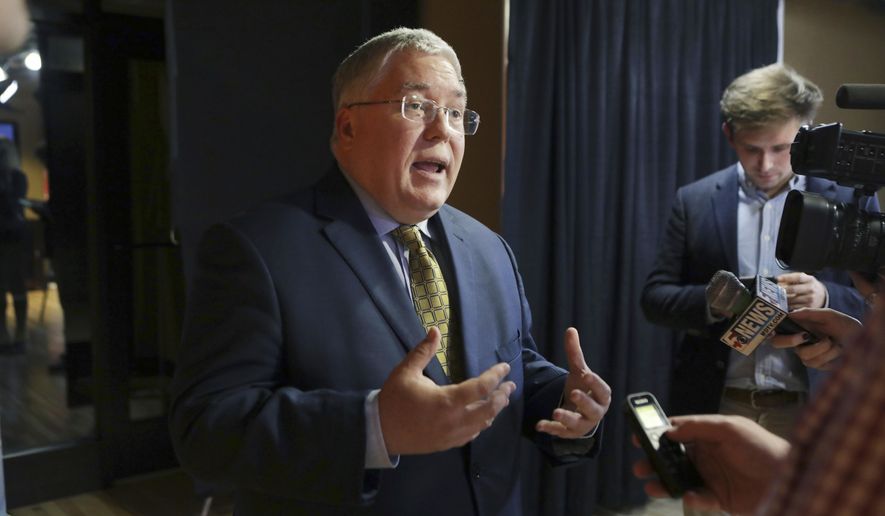An unspecified request for monetary fines lies buried in the lawsuit West Virginia Attorney General Patrick Morrisey filed last week against the Diocese of Wheeling-Charleston and retired bishop Michael J. Bransfield.
In the lawsuit, attorneys for West Virginia ask that the church “pay civil penalties for each and every willful and repeated violation” of the state’s consumer protection law.
How much could that be? A spokesman for Mr. Morrisey declined to provide specifics, calling it a “sensitive matter.”
The state law calls for a fine up to $5,000 for each day of each violation. That amount multiplied by the number of abused Catholic school students and the number of days they were subjected to a dangerous environment could overshadow previous multimillion-dollar settlements under the consumer protection laws.
Legal experts disagree on the merits of the attorney general’s lawsuit, which The New York Times called “unusual” as Mr. Morrisey is using consumer protection laws against the Catholic diocese with regard to its operation of schools in the state.
One thing is certain: The church’s legal costs continue to climb since the first payments to clerical sex abuse victims in the mid-1990s. An in-depth investigation by National Catholic Reporter suggested the total financial cost of the sex abuse to the Catholic Church is closer to $4 billion, not the often reported as $3 billion.
“NCR research shows that figure is too low, probably by as much as a billion dollars — and perhaps much more,” Jack Ruhl, an accountancy professor at Western Michigan University, wrote in 2015.
Digging through public disclosures by dioceses and media reports, the researchers estimated just shy of $4 billion has been spent on settlements with survivors and families of sexual abuse victims. They also estimated $2 billion lost annually in dwindling donations, due to parishioners leaving the pews.
Since 1990, dioceses ranging from Portland, Oregon, to Davenport, Iowa, have filed for Chapter 11 bankruptcy. After filing for bankruptcy in 2015, the Archdiocese of St. Paul and Minneapolis eventually settled with victims to disburse $210 million, financed by insurance monies, reorganized budgets from parishes and profits from the sale of properties.
Tom Abood, chairman of the Archdiocesan Finance Council and Reorganization Task Force, told The St. Paul Pioneer Press last year: “We will have to work hard … to make our budget work, but we will do it.”
The allegations against the Catholic Church in West Virginia include allowing predator priests “second chances” and insufficient background checks. In one instance, the diocese is alleged to have reassigned a pedophile to an elementary school in Wheeling but failed to advise parents.
“The Diocese and its Bishops chose to cover up and conceal arguably criminal behavior of admitted child sex abusers,” attorneys for the state wrote.
In a statement, the diocese lambasted the lawsuit as being filled with inaccuracies and said church leaders are “wholly committed” to protecting children.
Tuesday’s lawsuit follows on the heels of the diocesan authorities releasing a list of 18 “credibly accused” priests last fall, including some who also had been named in a Pennsylvania grand jury report in August.
The Vatican’s global wealth is nearly impossible to estimate accurately. But Mr. Ruhl told Vice News in 2018 that he had reviewed financial documents and estimated the church was wealthy enough to pay out settlements indefinitely.
• Christopher Vondracek can be reached at cvondracek@washingtontimes.com.




Please read our comment policy before commenting.